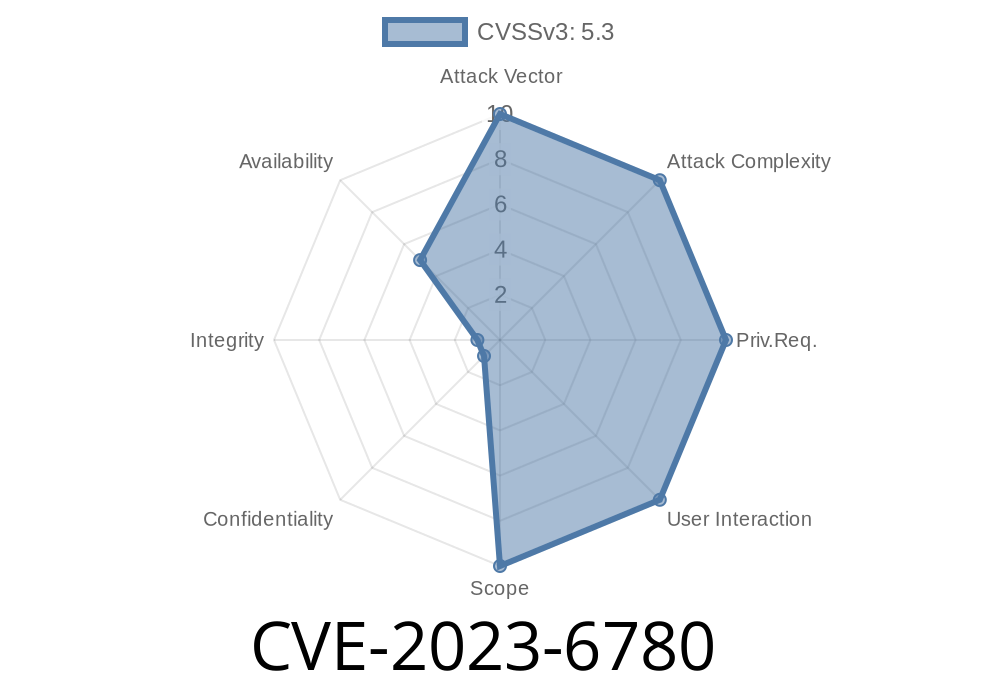Recently, a major vulnerability has been discovered in the GNU C Library (glibc), tracked as CVE-2023-6780. This post aims to provide an easy-to-understand explanation of this vulnerability, its consequences, affected systems, code snippets to demonstrate the issue, as well as the exploit details. We will also cover essential elements required to mitigate this vulnerability, including key links to original references.
Summary
CVE-2023-6780 is an integer overflow vulnerability found in the __vsyslog_internal function of the glibc library. GNU C Library is widely used and essential for various software and programs, making this vulnerability crucial. This particular issue occurs when the syslog and vsyslog functions are called with an unusually long message. Consequently, the buffer size calculation for storing the message is incorrect, resulting in undefined behavior. This vulnerability affects glibc versions 2.37 and newer.
Understanding the Vulnerability
First, let's understand how the syslog and vsyslog functions work. These functions are essential for handling system logging, particularly to report events or errors. Internally, these functions use the __vsyslog_internal function, which in turn calculates the required buffer size to store the message.
The vulnerability CVE-2023-6780 stems from an integer overflow in this internal function. An integer overflow occurs when a numerical value exceeds the maximum limit that can be represented by its integer data type, causing corrupt data or undefined behavior.
Here's a code snippet illustrating the issue in a simplified version
#include <stdio.h>
#include <stdarg.h>
#include <syslog.h>
#define LONG_MESSAGE_SIZE 1024 * 1024 * 1024
void exploit_syslog(char *fmt, ...) {
va_list args;
va_start(args, fmt);
vsyslog(LOG_USER | LOG_NOTICE, fmt, args);
va_end(args);
}
int main() {
char buf[LONG_MESSAGE_SIZE] = {};
memset(buf, 'A', LONG_MESSAGE_SIZE - 1);
exploit_syslog(buf);
return ;
}
In this code snippet, we define a very long message size (LONG_MESSAGE_SIZE) and implement a custom exploit_syslog() function that internally calls vsyslog(). In the main function, we create a buffer (buf) and fill it with a long message. Finally, we call the exploit_syslog() function, which triggers the integer overflow.
Exploit Details
The exploit for CVE-2023-6780 targets the incorrect buffer size calculation, focusing on the potential outcome of undefined behavior. This undefined behavior, in some cases, may lead to denial-of-service attacks, arbitrary code execution, or other unintended consequences, potentially compromising the target system.
To protect your system against CVE-2023-6780, it is essential to take the following mitigation steps
1. Update your glibc library to its latest version. The glibc project team has already provided a patch to fix the vulnerability. Download links for the updated version can be found in the references section.
2. Properly sanitize and validate inputs to the syslog and vsyslog functions. Ensure that excessively long log messages are not fed into these functions and implement appropriate length checks.
3. Regularly monitor the logs for any signs of suspicious activities or events, indicating that the vulnerability may have been exploited.
4. Apply general security best practices, such as using strong passwords, keeping software up-to-date, and enabling multi-factor authentication.
To learn more about CVE-2023-6780, please refer to these official resources and documents
1. CVE-2023-6780 - NIST National Vulnerability Database
2. GNU C Library Project
3. GNU C Library (glibc) Security Announcements
Conclusion
CVE-2023-6780 is a critical integer overflow vulnerability in the __vsyslog_internal function of the widely used glibc library. Immediate action is necessary, and we highly recommend monitoring your systems and applying the mitigation steps mentioned in this post to safeguard your infrastructure from potential exploits.
Timeline
Published on: 01/31/2024 14:15:48 UTC
Last modified on: 02/19/2024 12:15:44 UTC
